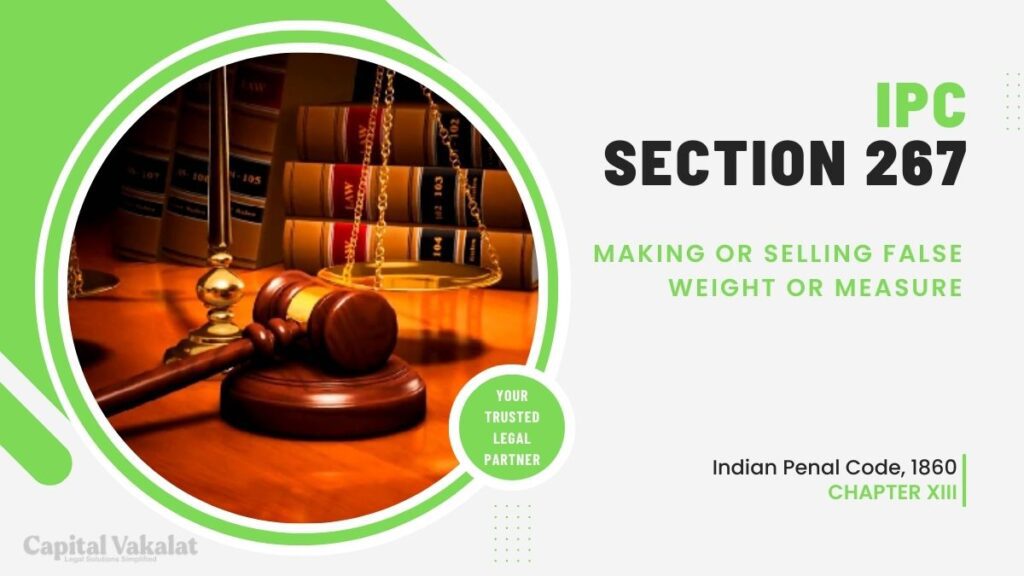In this comprehensive article, we will delve into Section 267 of the Indian Penal Code (IPC), which deals with the criminal offense of making or selling false weights or measures.

This legal provision plays a pivotal role in ensuring fair trade practices and consumer protection. We’ll explore the details of this section, its implications, and its relevance in modern society.
Introduction to Section 267 IPC
Section 267 of the Indian Penal Code, 1860, primarily deals with offenses related to the making or selling of false weights or measures. This provision is essential to maintaining fair trade practices and protecting consumers from fraud and exploitation.
Understanding the Offense
The offense outlined in Section 267 IPC involves the deliberate act of making or selling any weight or measure that is false. This can encompass various fraudulent practices, such as tampering with weighing scales, altering measuring instruments, or using inaccurate standards in trade. The overarching aim of this provision is to uphold integrity in commercial transactions.
Historical Perspective
The origins of Section 267 IPC can be traced back to the colonial era when the British enacted the Indian Penal Code in 1860. This move aimed to codify and consolidate the criminal laws in India. The inclusion of offenses related to weights and measures under Section 267 highlights the historical recognition of the importance of fair trade practices.
Legal Provisions and Penalties
Section 267 IPC lays down the law for those involved in making or selling false weights or measures. The penalties for this offense can vary depending on the severity of the act. In some cases, it may lead to imprisonment or fines.
The Significance of Fair Weights and Measures
Accurate weights and measures are fundamental in ensuring fair and transparent commercial transactions. They safeguard both consumers and businesses from dishonest practices, which can lead to financial losses and trust issues in the market.
Modern Applications
In contemporary society, Section 267 IPC remains highly relevant. With the advancements in technology, it’s crucial to adapt and incorporate modern measuring methods while ensuring they comply with the legal standards outlined in the IPC.
Challenges and Enforcement
Enforcing Section 267 can be challenging, especially in the digital age, where transactions happen rapidly and across various platforms. The authorities must adapt their techniques to combat the evolving nature of fraud in this domain.
Protecting Consumer Rights
Section 267 IPC serves as a legal safeguard to protect the rights and interests of consumers. It sends a clear message that deceptive trade practices will not be tolerated, thereby encouraging ethical conduct in business.
Conclusion
In conclusion, Section 267 of the Indian Penal Code, which pertains to making or selling false weights or measures, is a critical legal provision. It acts as a deterrent against fraudulent trade practices and upholds the principles of transparency and fairness in commercial transactions. As society evolves, so too must the enforcement of this provision to address new challenges and protect the rights of consumers.
This article has explored Section 267 IPC and its role in maintaining fair trade practices and protecting consumer rights. It emphasizes the need for transparent and ethical commerce while adapting to the challenges of the modern era.
Frequently Asked Questions
What are the penalties for violating Section 267 IPC?
Penalties can include imprisonment and fines, depending on the gravity of the offense. The court will determine the appropriate punishment on a case-by-case basis.
How does Section 267 IPC protect consumers?
This section safeguards consumers by deterring dishonest practices in trade, ensuring they receive fair value for their purchases, and maintaining trust in the market.
Are there any specific regulations or standards for weights and measures in India?
Yes, India has established legal metrology regulations to maintain uniformity and accuracy in weights and measures. These regulations help ensure fair trade practices.
Can businesses and traders use digital measuring instruments, or are there specific guidelines?
Digital measuring instruments can be used, but they must adhere to the legal metrology standards set by the government to prevent any manipulation or fraud.